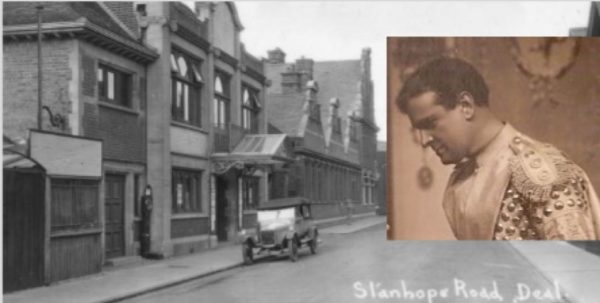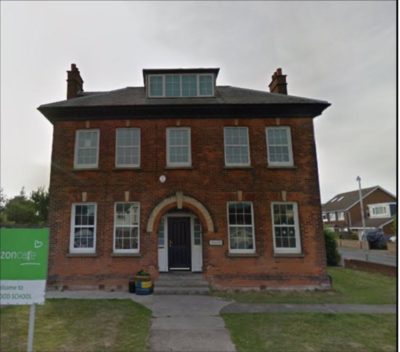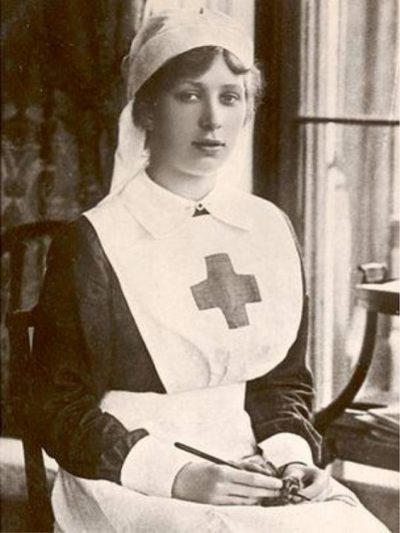Belgian Refugees Entertain
The founding of the Deal Cercle Belge Comoedia was also down to the Franco Belgee members. The Cercle put on concerts in aid of the refugees and to raise funds for the future needs of the widows and orphans of fallen Belgian soldiers.
A deputation from the newly formed Cercle visited the Consul General of Belgium in London to announce its inauguration he in return “..wished them good luck and success in their efforts and a rich harvest of profits for the good cause.”
The first Cercle Comoedia concert was held on 30 December 1914 at Stanhope Hall, now the Astor Theatre. As well as their own performances they were able to secure celebrities of the time such as the Lyric Theatre’s Roland Cunningham.
Desperately trying to leave occupied Belgium
Throughout 1914 and 1915 people still tried to leave the occupied areas and some tragic cases were reported on in the papers –including one of a suicide on board a Dutch steamer, who was sheltering in the Downs on which a woman“….seeing no way forward had hung herself in her cabin” She was from Liege where her house had been reduced to ruins and her husband and only son had been killed
Then in November, another desperate case was reported on luckily this time with a happier outcome. Titled “ The Pitiable Plight of Two Families’ and in brief, it said
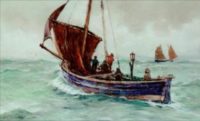 ‘On Wednesday 25th November 1914 a small group of 3 women and 10 children were landed on Deal Pier. They had crossed the channel during a gale in 3 Ostend open fishing boats. First, they had tried to land in France then they attempted to land at Dover but were refused permission due to the regulations there, but Mr. Fisher a Trinity Pilot was put on-board with instructions to take them to ‘some other English port’. With the wind failing in the Downs he anchored off Deal Pier it was then decided that they should land. The Coastguard was alerted and after Mr.Geddes the Customs House officer had completed the necessary formalities– word was sent to Wesley Hall to make preparations for these poor women and children. Dr. Mason the Port Medical officer was summoned to examine the party who had suffered greatly from seasickness and exposure. Once at Wesley Hall though, it was reported that they soon recovered after receiving warm food, dry clothing and a bed.’
‘On Wednesday 25th November 1914 a small group of 3 women and 10 children were landed on Deal Pier. They had crossed the channel during a gale in 3 Ostend open fishing boats. First, they had tried to land in France then they attempted to land at Dover but were refused permission due to the regulations there, but Mr. Fisher a Trinity Pilot was put on-board with instructions to take them to ‘some other English port’. With the wind failing in the Downs he anchored off Deal Pier it was then decided that they should land. The Coastguard was alerted and after Mr.Geddes the Customs House officer had completed the necessary formalities– word was sent to Wesley Hall to make preparations for these poor women and children. Dr. Mason the Port Medical officer was summoned to examine the party who had suffered greatly from seasickness and exposure. Once at Wesley Hall though, it was reported that they soon recovered after receiving warm food, dry clothing and a bed.’
St. Nicholas Celebrations
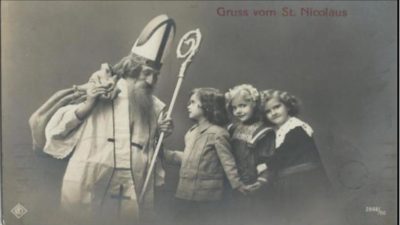 With Christmas soon to be upon the town a young girl from Deal, who had been at school in Ghent, pointed out the importance of St. Nicholas to the Belgian children to one of the Committees. They decided to organise a ‘St. Nicholas fete’ at Stanhope Hall.
With Christmas soon to be upon the town a young girl from Deal, who had been at school in Ghent, pointed out the importance of St. Nicholas to the Belgian children to one of the Committees. They decided to organise a ‘St. Nicholas fete’ at Stanhope Hall.
Invitation cards were sent out saying in French saying
“Saint Nicholas invites all his Belgian friends to his party Saturday, December 5th at 3 O’clock Stanhope Hall
(near post office) Deal.”
On that Saturday of Sinterklaas Eve a party for the Belgian children, their parents, some local children and the wounded Belgian soldiers from Deal, Walmer and the surrounding villages, was held. It was reported that
“A 12 foot Christmas tree was lent by Messrs. G and A Clark, Ltd of Walmer. Tea was served, games played and then with lights dimmed St. Nicholas appeared with a sack full of ‘crackers, sweets and presents’. At the end of the evening, the Belgium National Anthem and God Save the King was sung before the gathering came to a happy ending”.
Government Reports
In November 1914, as the government started to get to grips with the refugee situation, requests for information from the towns hosting the refugees were made. At the Kent Archives, there are the replies of the District Relief Sub-committees which give the number of refugees in each to town and village.
A report in the newspaper stated that by the end of 1915 there were 163 refugees living in Deal & Walmer. I know that there does seem to be discrepancies in numbers here particularly after the twelve to fifteen hundred that had initially been reported. However, many of the refugees who came to Deal and Walmer moved on. Some went to be with family members in other parts of the country and they were helped on their way by the local committees. If they needed or wanted employment they were moved to where it was found for them and, of course, the young men may have gone into the Belgian Military. As the Home Office had stated that it was “..inadvisable to send aliens to the coastal towns..” those that could go elsewhere were probably encouraged and helped to do so. Local committee membersMrs Bouchier, Mrs Davis and Mrs Hughes wrote to committees all over the British isles endeavouring to find homes for some of the “professional classes”.They were successful in finding homes for 180 families.In May 1915 the Deal & Walmer Refugee Relief Committee presented its accounts which were then printed in the paper. This showed that they paid for clothing, rents, rail fares, gave grants to those in need. The total amount spent by that time was just over £344. The fund was wound up in May 1919 which suggests that most of the Deal and Walmer refugees had returned home by then.
Wounded Belgian Soldiers
Here in Deal & Walmer several hospitals were set up for the care and recuperation of soldiers and our Alost witness stumbled upon the Grange hospital whilst out walking. He describes how he saw the Red Cross flag floating over the hospital and he says “wafting through the air a well-known song sung by male voices reached my ears and My heartstrings thrilled at the sound of this familiar melody”. And that he then “.. knocked at the door to ask if this was indeed a hospital for Belgian soldiers and if so could he be allowed to look around?”
He gave praise and thanks to the staff of the hospital particularly to a Mrs.Trumper who told him that “….we must amuse our invalids”.
The Patriots League
Mrs Trumper was very active not only with the care of wounded Soldiers but also the refugees and was the President of the towns Patriots League, a national organisation providing for the refugees, whose president was Princess Mary.
In Deal & Walmer The Patriots League helped support thirteen families with food, clothing, wood and coal. These resources were paid for by the weekly donations of a penny or more from its members and other much larger donations. It is said the school children of Deal, Walmer and Kingsdown also contributed their pocket money to the general fund.
The Patriots League planned and put on a Cafe Chantant (cabaret style fete) at Walmer Parish Hall on May 6th 1915. Performances were given and stalls were run by the town’s people and the Belgians themselves. During tea, the Royal Marines string band played a selection of waltzes and the tea was served by waitresses wearing sashes in the Belgian colours. A telegram from Princess Mary conveying her thanks to the Patriots League was also read out.
“The Princess Mary Desires to convey her sincere thanks to the 537 members of the Young Patriots’ League for their kind greeting which her Royal Highness much appreciates” (Buckingham Palace 12.20)
Mrs Marke Wood, who with her daughter later gave us the park in that name, declared in her speech that she would be
“… very pleased to assist in paying the rents of Belgian refugees in need ….” this obviously relieved a large financial burden on the fundraising committees and may explain why there were very few reports of fundraising activities in the newspapers after 1915.
